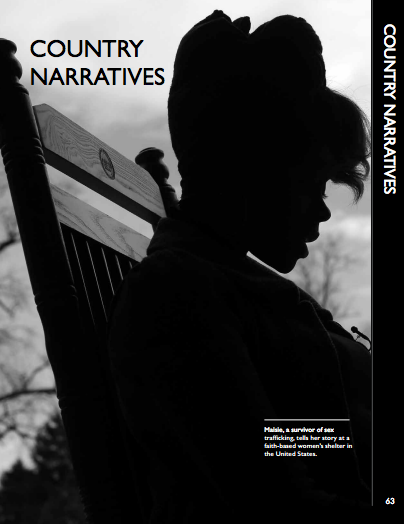
Trafficking In Persons Report 2015 – Country Narratives: Cambodia
Publication Year: 2015 / Sources: U. S. Department Of StateCambodia is a source, transit, and destination country for men, women, and children subjected to forced labor and sex trafficking. Cambodian adults and children migrate to other countries within the region and, increasingly, the Middle East for work; many are subjected to sex trafficking or forced labor on fishing vessels, in agriculture, construction, factories, or domestic servitude.
Download: English | Khmer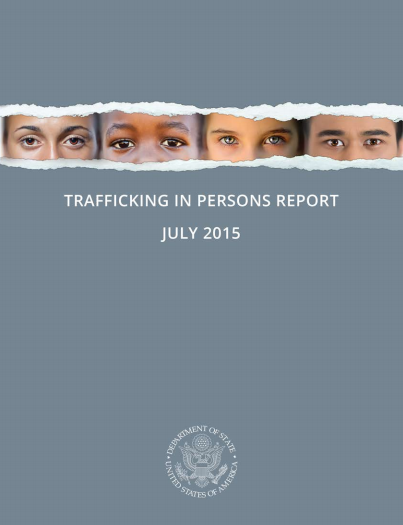
Introduction – Trafficking In Persons Report 2015
Publication Year: 2015 / Sources: Department of State - United States of America“Trafficking in persons is an insult to human dignity and an assault on freedom. Whether we are talking about the sale of women and children by terrorists in the Middle East, the sex trafficking of girls lured from their homes in Central Europe, the exploitation of farm workers in North America, or the enslavement of fishermen in Southeast Asia, the victims of this crime each have a name. And they each have been robbed of their most basic human rights.” – Secretary of State John F. Kerry
Download: English | Khmer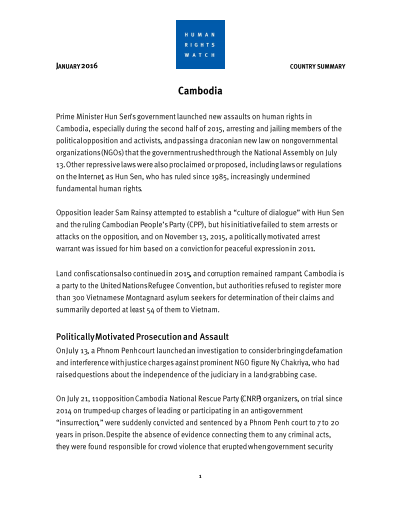
World Report 2016 – Cambodia
Publication Year: 2016 / Sources: Human Rights WatchWorld Report 2016 summarizes key human rights issues in more than 90 countries and territories worldwide. It reflects investigative work that Human Rights Watch staff undertook in 2015, usually in close partnership with human rights activists in the country in focus. This report is the summary of human rights situation in Cambodia.
Download: English | Khmer
Cambodia: A Survey of Livelihood Strategies and Expectations for the Future
Publication Year: 2015 / Sources: The Asia FoundationWith this research, The Asia Foundation continues to provide analysis and insight into the remarkable economic, social, and political changes occurring today in Cambodia. The aim of this report is to better understand the most recent social, political, and economic trends among various social groups in Cambodia, by canvassing their opinions of and expectations for economic improvement, social reform, and political choice, locally and nationally.
Download: English | Khmer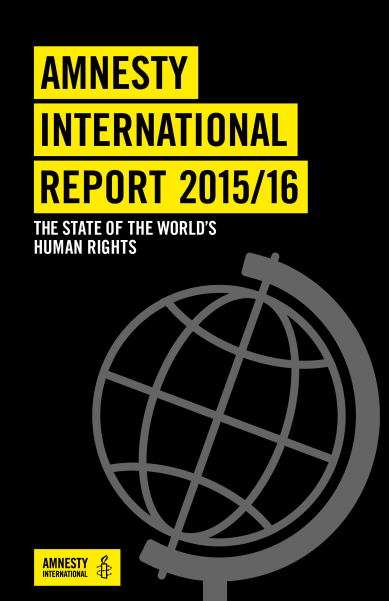
Amnesty International Report 2015/16: The State of the World’s Human Rights
Publication Year: 2016 / Sources: Amnesty InternationalThe Amnesty International Report 2015/16 documents the state of the world’s human rights during 2015 including five regional overviews and a survey of 160 countries and territories highlight the suffering endured by many, be it through conflict, displacement, discrimination or repression. In the Asia-Pacific region such as China, Cambodia and Vietnam…ect even as rapid social and economic change continued , the human rights situation often remained bleak
Download: English | Khmer
Access to Justice for Children: Cambodia
Publication Year: 2016 / Sources: Child Rights International Network (CRIN)The Constitution of the Kingdom of Cambodia 1993 (the “Constitution”) does not explicitly determine the status and authority of international treaties. However, it requires the state to recognise and respect the rights stipulated in human rights conventions, including the Convention on the Rights of the Child (CRC). Child Rights International Network (CRIN) ranked Cambodia 166 out of 197 countries for the effectiveness of its courts in protecting children in 2015.
Download: English | Khmer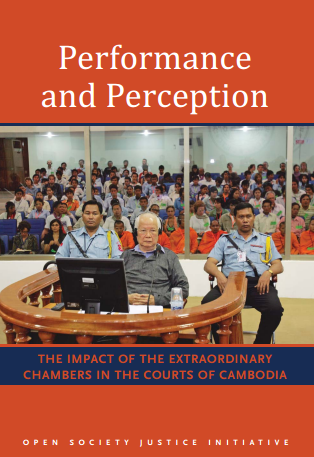
Performance and Perception: The Impact of the Extraordinary Chambers in the Courts of Cambodia
Publication Year: 2016 / Sources: Open Society FoundationsThis report attempts to examine both how the ECCC has performed, and how Cambodians perceive its performance. It seeks first to analyze the ECCC’s record to date in meeting its primary goal of providing justice to the victims of the KR by establishing credible accountability for the highest level perpetrators and thus ending impunity for the worst crimes of the KR. Second, this report examines the court’s record in meeting its secondary goals of contributing to an improved domestic justice system, healing and reconciliation for victims and perpetrators, and a better general understanding of what happened during the KR regime.
Download: English | Khmer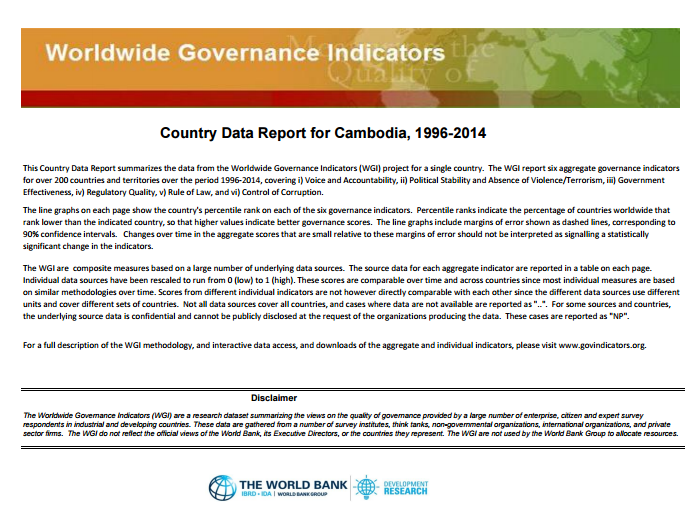
Worldwide Governance Indicators: Country Data Report for Cambodia, 1996-2014
Publication Year: 2015 / Sources: The World Bank group (Worldwide Governance Indicators)The Worldwide Governance Indicators (WGI) project reports aggregate and individual governance indicators for 215 economies over the period 1996–2014, for six dimensions of governance: Voice and Accountability; Political Stability and Absence of Violence; Government Effectiveness; Regulatory Quality; Rule of Law; Control of Corruption.
Download: English | Khmer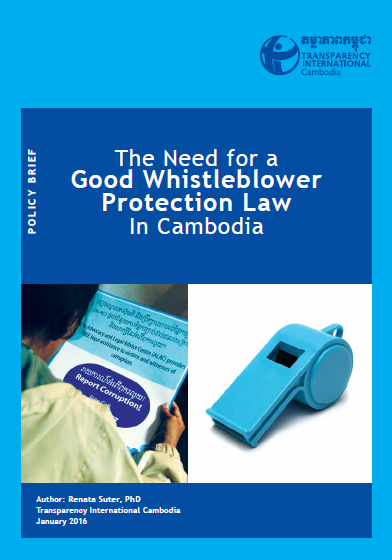
The Need for a Good Whistleblower Protection Law In Cambodia
Publication Year: 2016 / Sources: Transparency International CambodiaWhistleblowers play a crucial role in the fight against corruption. In order to encourage them to speak up, legal protection is essential. However, the Cambodian Law on Anti-Corruption as it stands might have a deterrent effect on speaking up, as proper protection for whistleblowers that report in good faith is not assured and the threat of imprisonment exists (Article 41).
Download: English | Khmer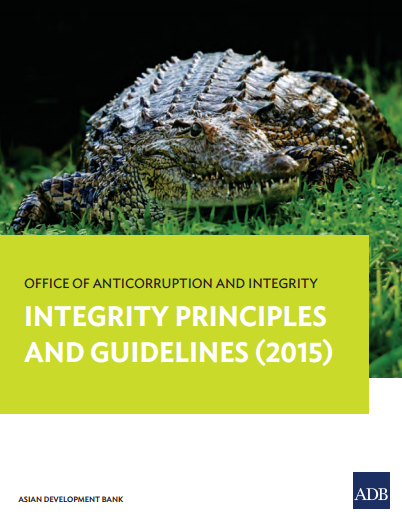
Integrity Principles and Guidelines
Publication Year: 2015 / Sources: Asian Development BankThese principles and guidelines are intended to be used as guidance in the conduct of investigations in conjunction with the policies, rules, regulations, and privileges and immunities applicable in the Organization.
Download: English | Khmer